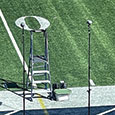Details about my first opportunity to audition for a position in an honor band are rather fuzzy in my memory. When I was in ninth grade, my band director handed me an advanced trumpet solo, much of it written in what was to me an exotic 3/8 time. I had to know a bunch of scales, but cannot remember if there was anything out of an Arban book or not. Whatever the case, it was an all-state audition that he took me to. The main thing I remember was how little I understood about the whole process. While I think my naiveté strangely provided some kind of buffer from the terror I normally would have experienced, I have found in my teaching experience that this fear of the unknown can be quite stressful for students who are placed in an unfamiliar situation.
While it may be impossible to eliminate all of the nervousness students experience as the audition day approaches, I have found it helpful and calming for students if I go over audition procedures thoroughly before the event. I print out the directions below and give a copy to each student; if you choose to do this also, be sure to adapt the directions to meet the guidelines and procedures in your particular area.
Student Tips for All-Region and All-State Tryouts
The first thing you do when you arrive is become familiar with the layout of the tryout area. Take your instrument (with your name and school name on the case) to the warmup area. Find your tryout room. Some instruments have two rooms, so find them both.
The tryout music will be posted thirty minutes before tryouts begin. Take a pencil and mark your music and write down the three scales. (Write the scales down in order; they must be played that way.) Percussionists will have exercises selected for snare, timpani, and keyboard.
Get to your room early.
While waiting in the halls, do not play. Instead, gently blow warm air through your instrument. Periodically take a deep breath to relax yourself. Some of the larger sections will have two rooms – one for prepared material and another for sight-reading and scales. The prepared room is generally first. After you finish that room, you will go directly to the sightreading and scales room. Percussionists will have three tryout rooms, one each for snare, keyboard, and timpani.
Use your music in the tryout room. If a monitor says you cannot use it, they are wrong. If for some reason you have lost your music, there will be some provided in the tryout room. Do not use a friend’s music unless he is finished; otherwise it may cause a mix-up.
Wind players may choose to stand or sit when they play. Adjust the music stand if necessary. The judges will be behind a hanging curtain or sheet. They will not be able to see you.
Play the first note of each exercise or scale to make sure you have the correct pitch before you begin the exercise. Concentrate on the correct tempo before you begin, and do not let nerves make you rush.
Move efficiently from one exercise to another. Do not talk in the tryout room if at all possible. Whisper to the monitor if you have a question. If you have to stop playing during an exercise, begin where you left off. Do not go back to the beginning.
You will have 20 seconds to look at the sightreading. Use the procedures we have taught you. Play the exercise at a reasonable tempo and do not stop.
When you are finished, load your instrument on the bus. We will have the results for you after all the tryouts are over. Results are not final until Monday.
General Guidelines
If your instrument breaks at any time, just relax. Find a band director in the library (not necessarily one of us, we may be judging) and ask them to look at it. If they cannot fix it, borrow one. Inform the monitor if you are going to be late. If your instrument or reed breaks while in the tryout room, tell the monitor. They can then tell the judge and something can be done. Woodwind players should have multiple playable reeds ready to go.
Do not leave the campus area.
Have respect for the host’s facilities. You are representing our school. Do not draw undue attention to yourselves. Any attention you receive should be for being a class act.
Bring money for lunch. There will be food at the tryouts.
We will not be able to answer a hundred questions at tryouts. You will be tempted to ask us something as soon as it pops into your head. Resist this temptation. If you have a question, follow this plan:
Think hard for five minutes to remember whether an answer has already been explained.
Find a friend and think hard for another five minutes.
Find several friends (maybe even someone who has been to tryouts before) and think hard for five more minutes.
If by then you cannot figure things out, ask one of us.
Do not tell us your tryout time or number.
Just do your best. You are valuable to our band program regardless of whether you are selected. No matter what happens, we still love you.





